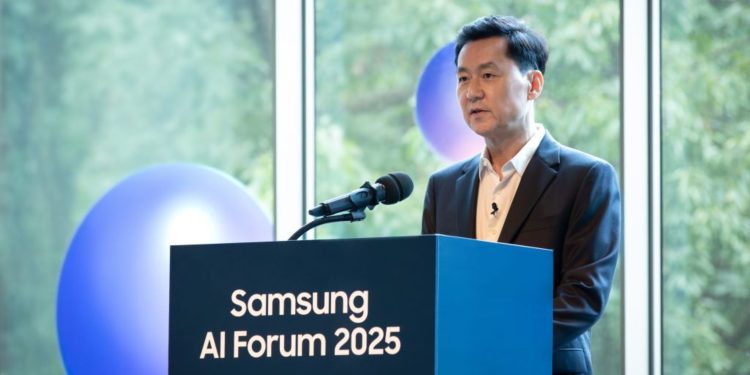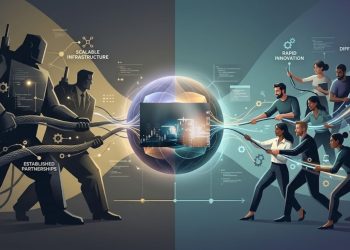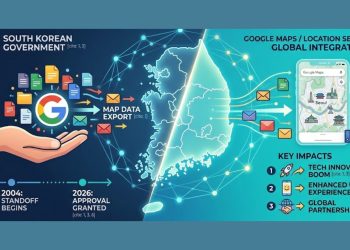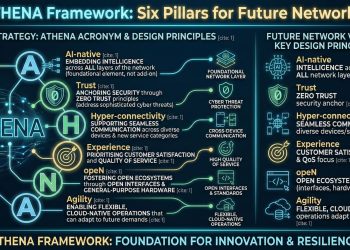The ninth edition of the forum highlighted breakthroughs in deep learning, diffusion models, and AI-driven semiconductor design.
Samsung AI Forum 2025, held on September 15–16, brought together leading scholars, industry experts, and Samsung executives to discuss emerging trends and research in artificial intelligence. Now in its ninth year, the forum provided a platform for technical exchange and forward-looking discussions on AI technologies across industries.
In his opening address, Young Hyun Jun, Vice Chairman and CEO of Samsung Electronics, emphasized the company’s ongoing commitment to AI innovation.
“Samsung is applying AI across our operations to develop foundational technologies that make AI more intuitive and seamless,” he said.
“This year’s Samsung AI Forum brings together leading experts from industry and academia to discuss how AI is transforming society and industry, and to share insights in what we expect will be a meaningful exchange of ideas.”
The forum included a mix of public and private sessions. Mobile and home appliance AI programs were streamed online, while discussions on semiconductors were kept confidential, reflecting Samsung’s differentiated approach across its business units.
Keynote Highlights: Innovation and Risks
The first day, hosted by Samsung’s Device Solutions Division near its Yongin semiconductor site, focused on “Vertical AI Strategies and Vision for the Semiconductor Industry.” Keynote speakers included Professor Yoshua Bengio of the University of Montreal and Professor Stefano Ermon of Stanford University.
Professor Bengio highlighted the potential risks associated with current AI models, including their ability to bypass human oversight and be misused. To address these concerns, he introduced Scientist AI, a model designed to provide factual, data-driven responses.
“Unlike models built to mimic or please humans, Scientist AI focuses on providing truthful answers grounded in verified facts and data,” he said, noting its potential to improve AI safety and accelerate scientific discovery, including applications in materials research.
Professor Ermon discussed diffusion-based language models (DLMs) that apply techniques from image, video, and audio generation to language, aiming to overcome the limitations of traditional sequential text generation. Amit Gupta, Senior Vice President of Siemens EDA, emphasized integrating AI into electronic design automation to enhance efficiency and unlock the full potential of chip design workflows.
Samsung executives and academics, including Yong Ho Song of Samsung’s AI Center, Professor Seokhyung Kang of POSTECH, and Professor Il-Chul Moon of KAIST, shared advances in semiconductor design and AI applications for manufacturing. Song highlighted:
“AI is already an essential tool in chip design and software development. As semiconductor manufacturing grows more complex, we expect AI to help address the technical challenges that arise.”
Recognizing AI Excellence
The forum also celebrated achievements in AI research, awarding Samsung AI Researcher of the Year to Professor Nicolas Papernot (University of Toronto), Professor Rose Yu (UC San Diego), and Professor Lerrel Pinto (New York University). Each awardee presented their latest research, demonstrating AI’s expanding influence across multiple disciplines.
From Generative to Agentic AI
The second day, hosted online by Samsung’s Device eXperience Division, focused on “Generative to Agentic AI.” Paul (Kyungwhoon) Cheun, CTO of the DX Division, described agentic AI as capable of predicting user needs, understanding context, and acting autonomously:
“Generative AI has already become an essential tool across daily life and industries. As we enter the era of Agentic AI, Samsung will continue to focus on developing AI technologies that provide users with tangible benefits.”
Practical Applications and Innovations
Samsung researchers also presented a range of emerging technologies designed for consumer devices. These included innovations in camera AI for automatic color adjustment, on-device training methods for LLMs, automatic dubbing, multi-agent systems for report generation, document AI, and developer tools to accelerate generative AI applications. Collectively, these technologies highlight Samsung’s strategy to integrate AI seamlessly into devices while improving efficiency and user experience.
Agentic AI: Personalization and Efficiency
Agentic AI represents a step beyond generative AI, combining autonomous decision-making with contextual understanding. Professor Gonzalez explained:
“AI manages information obtained during conversations in short and long-term memory and appropriately utilizes it when necessary. This allows AI to communicate more naturally and in-depth with users.”
Samsung is focusing on two types of agentic AI. User agents learn individual preferences and function as digital twins of users, providing personalized services. Advisor agents coordinate multiple AI models to support complex tasks, improve productivity, and optimize workflows through reinforcement learning. These capabilities are being integrated into smartphones, wearables, and smart home devices to provide tailored services while strengthening Samsung’s position in the AI ecosystem.
Looking Ahead
The ninth Samsung AI Forum highlighted Samsung Electronics’ dual approach: advancing AI research while creating practical applications for consumers and industries. By investing in agentic AI, diffusion language models, and semiconductor-focused AI solutions, Samsung is positioning itself at the forefront of intelligent technology. The forum underscored the opportunities and challenges of AI, emphasizing the need for responsible, efficient, and user-centered innovation to shape the next era of artificial intelligence.
Image credits: Samsung







